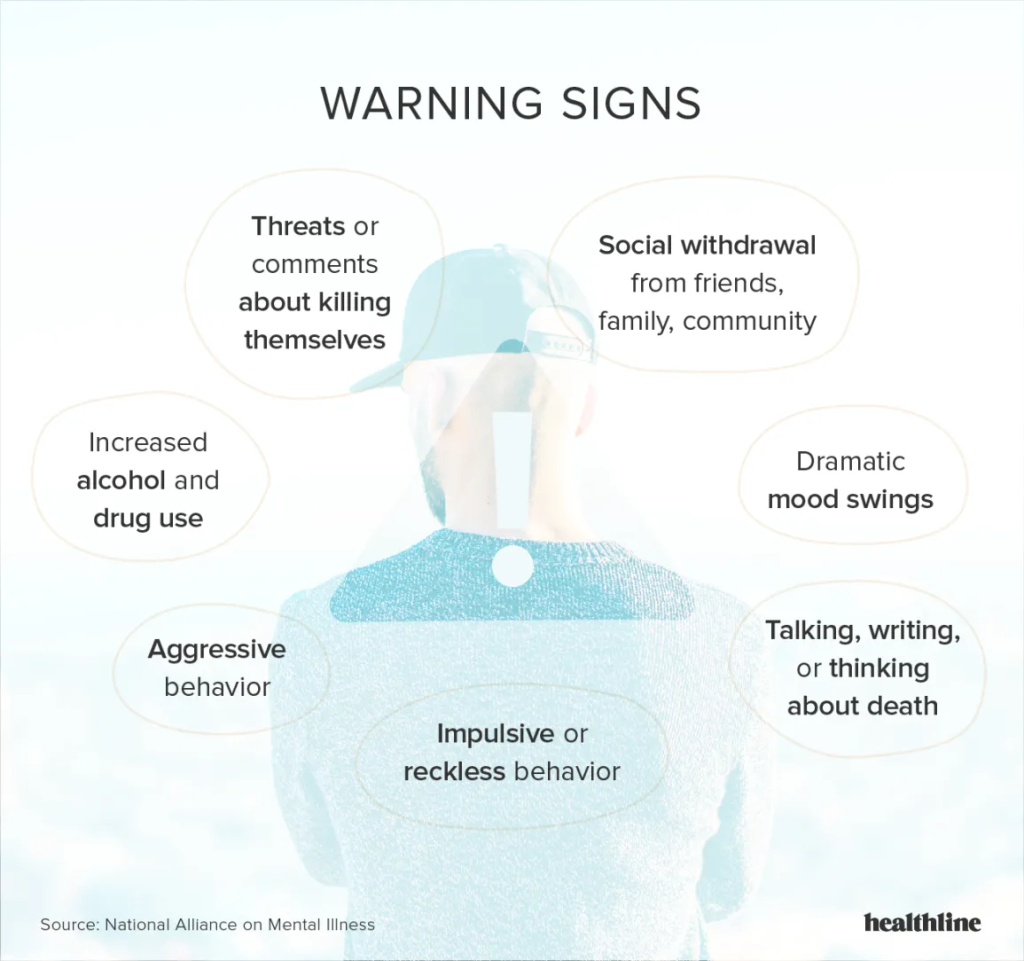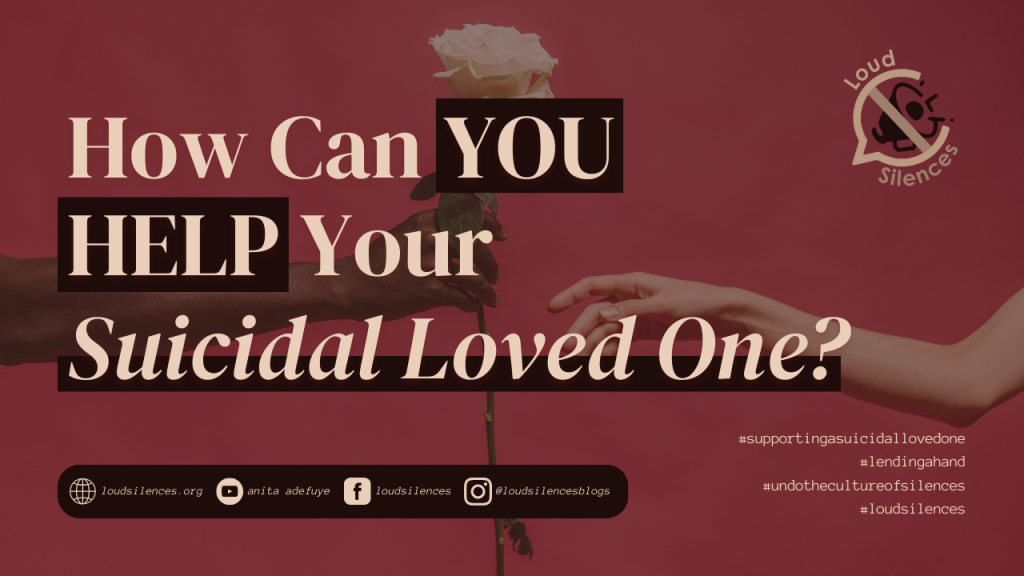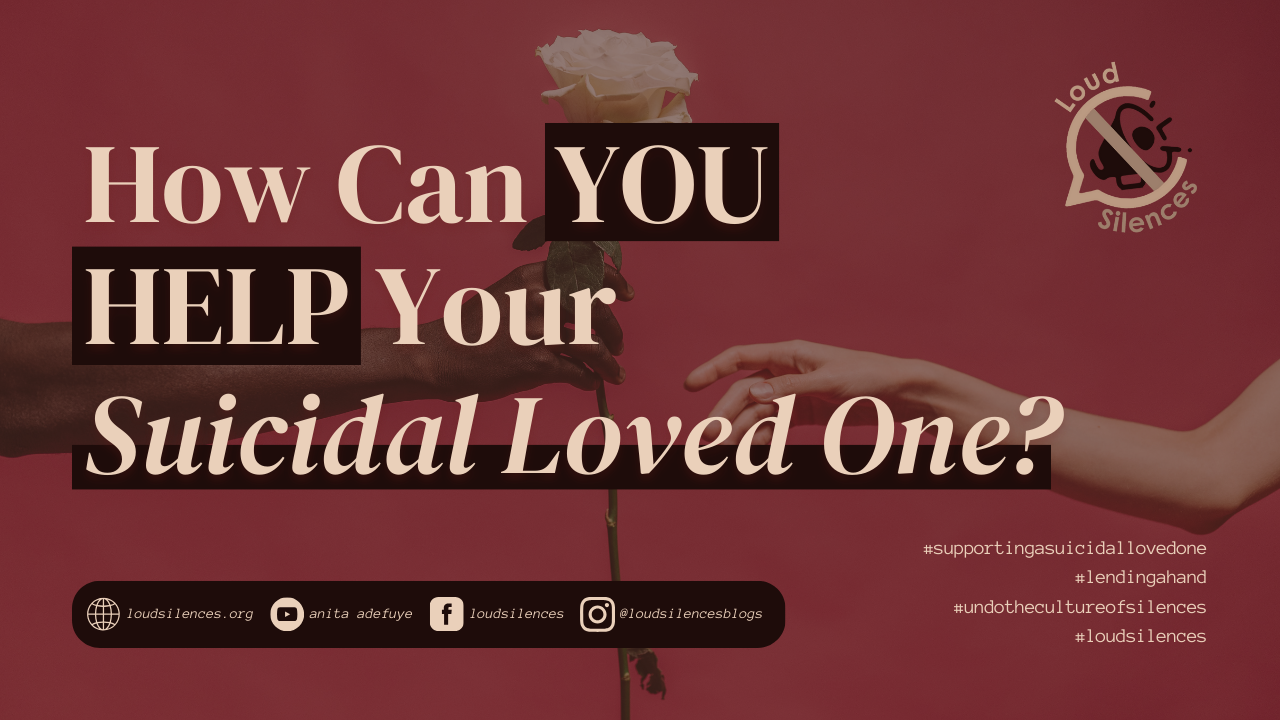September 10, 2023 is World Suicide Prevention Day, and the theme is “Creating Hope Through Action.” So, we will be talking about supporting a loved one with suicidal thoughts or tendencies.
Suicide is a major worldwide health problem, with 703,000 people attempting it every year. Many individuals, including our loved ones, face difficulties that may lead them to consider suicide. For example, some challenges people face are financial stress, mental disorders, bullying, discrimination, unemployment, traumatic event, etc.
This widespread occurrence is a deeply saddening phenomenon that impacts families, communities, and nations. It is important to support our loved ones with suicidal thoughts because suicide is a preventable public health issue.

Supporting someone who is struggling can help them feel less alone and can encourage them to seek professional help. Additionally, suicide prevention requires a community effort, and by supporting those who are struggling, we can work towards reducing the stigma surrounding mental health and preventing suicide
So, what suicidal signs should you watch for in your loved one?
The following warning signs indicate that someone is at risk of suicide:
- Talking about wanting to die or to kill oneself
- Looking for a way to kill oneself, such as searching online or buying a gun
- Talking about feeling hopeless or having no purpose
- Talking about feeling trapped or in unbearable pain
- Talking about being a burden to others
- Increasing the use of alcohol or drugs
- Acting anxious or agitated
- Behaving recklessly
- Sleeping too little or too much
- Withdrawing or feeling isolated
- Showing rage or talking about seeking revenge
- Displaying extreme mood swings
Therefore, if you or someone you know is experiencing any of these signs, please seek help immediately. Resources and helplines are listed below.

How can you help your loved one with suicidal behaviors?
Supporting a loved one who is exhibiting suicidal behaviors can be challenging and emotionally distressing, but it is crucial to provide help and care. Here are some steps you can take:
Take Their Words Seriously:
If someone you care about mentions or hints at suicidal thoughts or behaviors, take them seriously. Specifically, don’t dismiss their words or assume they’re just seeking attention. Dismissing them shuts them down in wanting to seek any further help. Keep in mind that suicidal thoughts are a sign of immense emotional pain.
Stay Calm:
It’s important to remain calm when discussing the issue. Your loved one may be in a highly emotional state; therefore, your calmness can help them feel safer and more understood.
Listen Actively:
Also, encourage your loved one to talk about their feelings and thoughts without judgment. Let them express their emotions without interrupting or trying to immediately solve their problems. Sometimes, just being heard can provide relief.
Express Empathy:
While they may not feel the empathy, let your loved one know that you care about their well-being and that you’re there to support them. Express empathy by saying things like, “I’m here for you,” or “I’m so sorry you’re feeling this way.”
Ask Open-Ended Questions:
Gently ask open-ended questions to understand their feelings better. For example, you can ask, “Can you tell me more about what’s been going on?” or “How long have you been feeling this way?” Doing this creates room to talk and expand on what they’re going through.
Encourage Professional Help:
Suicidal thoughts are a sign of a mental health crisis. Encourage your loved one to seek professional help, such as a therapist, psychiatrist, or crisis hotline. Offer to help them find a mental health professional or accompany them to appointments.
Choosing to seek help is not a sign of weakness but one of strength.
Remove Immediate Risks:
If there is an immediate threat to their safety, take action. This might involve removing dangerous items (e.g., pills, weapons) from their vicinity or calling emergency services if necessary.

Stay Connected:
In the meantime, continue to stay connected with your loved one regularly. Send messages, call, or visit if possible to let them know you care and are there for them. Loneliness can exacerbate their distress.
Respect Their Privacy:
While you should encourage them to seek help, respect their privacy and choices. They may not be ready to share everything, and pushing too hard can be counterproductive.
Involve Trusted Friends and Family:
Fortunately, you don’t have to face this situation alone. Firstly, reach out to trusted friends and family members who can provide support. Furthermore, this support network can offer more resources and perspectives, and can help alleviate some of the burden.
Educate Yourself:
Learn more about suicidal behaviors, mental health, and available resources. Understanding the challenges your loved one is facing can help you provide better support.
Self-Care:
Supporting someone who is struggling can be emotionally draining. However, make sure to take care of your own mental and emotional well-being. You should certainly seek support for yourself from friends, family, or a therapist if needed.
Remember that while you can be a source of support, you are not a substitute for professional help.
As mentioned earlier, encourage your loved one to seek treatment from mental health professionals who are trained to address suicidal behaviors and provide the necessary interventions. Therefore, to ensure the safety of your loved one, it is important to remember that if there is an immediate risk of harm, do not hesitate to contact emergency services or a crisis hotline.
Resources to provide your loved one
Talk Suicide Canada
- If you or someone you know is thinking about suicide, call Talk Suicide Canada at 1-833-456-4566 (24/7) or text 45645 (4 PM – 12 AM ET).
- For residents of Québec, call 1 866 APPELLE (1-866-277-3553) (24/7) or visit suicide.ca.
- Visit Talk Suicide Canada for the distress centers and crisis organizations nearest you.
Kids Help Phone
- Call 1-800-668-6868 (toll-free) or text CONNECT to 686868.
- Available 24 hours a day to Canadians aged 5 to 29 who want confidential and anonymous care from professional counsellors.
- Download the Always There app for additional support or access the Kids Help Phone website.
Hope for Wellness Help Line
- Call 1-855-242-3310 (toll-free) or connect to the online Hope for Wellness chat.
- Available to all Indigenous peoples across Canada who need immediate crisis intervention. Experienced and culturally sensitive help line counsellors can help if you want to talk or are distressed.
- Telephone and online counselling are available in English and French. On request, telephone counselling is also available in Cree, Ojibway and Inuktitut.
Suicide Helplines Nigeria
Creating Hope Through Action
World Suicide Prevention Day
Takeaways
Taking steps to support and help your loved one struggling with suicide is creating hope through action. It is sending a clear message that suicide is not the answer and there is help for them. So, from this blog, keep these in mind.
- Take suicidal thoughts seriously and seek professional help immediately.
- Listen actively and express empathy when supporting a loved one with suicidal thoughts.
- Encourage your loved one to seek professional help and offer to help them find a mental health professional or accompany them to appointments.
- Remove immediate risks if there is an immediate threat to their safety.
- Educate yourself about suicidal behaviors, mental health, and available resources.
- Take care of your own mental and emotional well-being while supporting a loved one who is struggling.
Remember, there is help, there is hope.

Her book, Reve-Healed – A true story of pain, healing, and hope, is available for purchase. Get yourself a copy today!

Leave a Reply